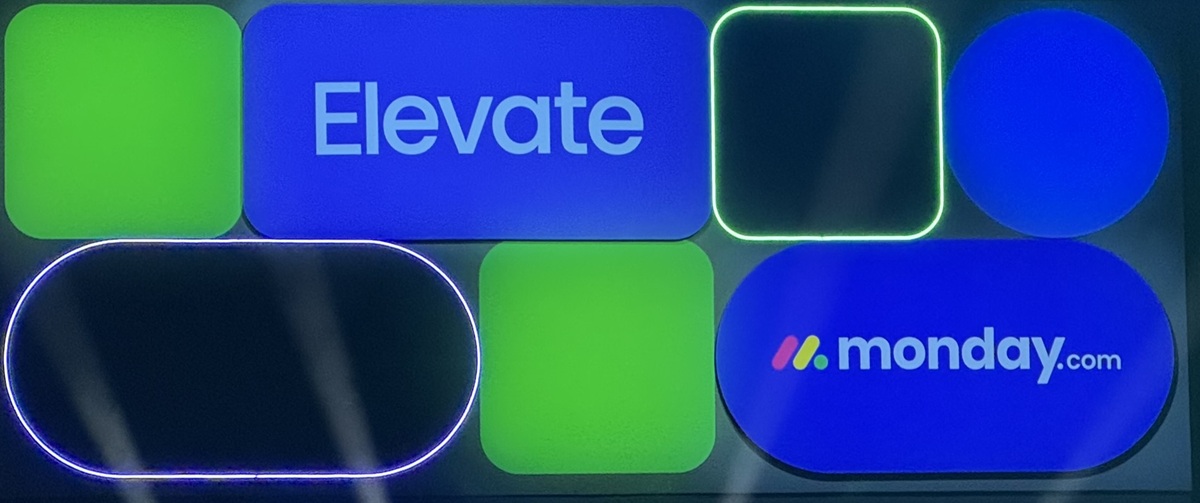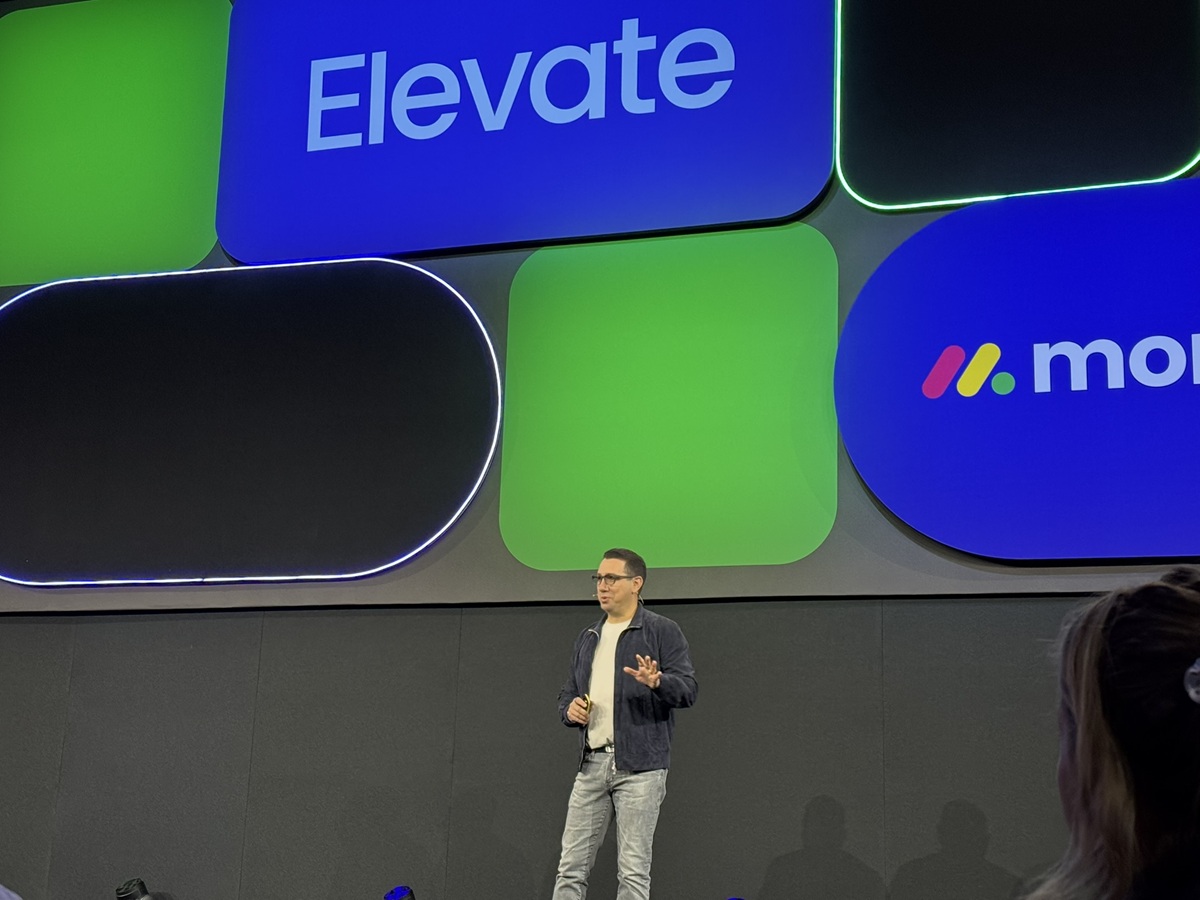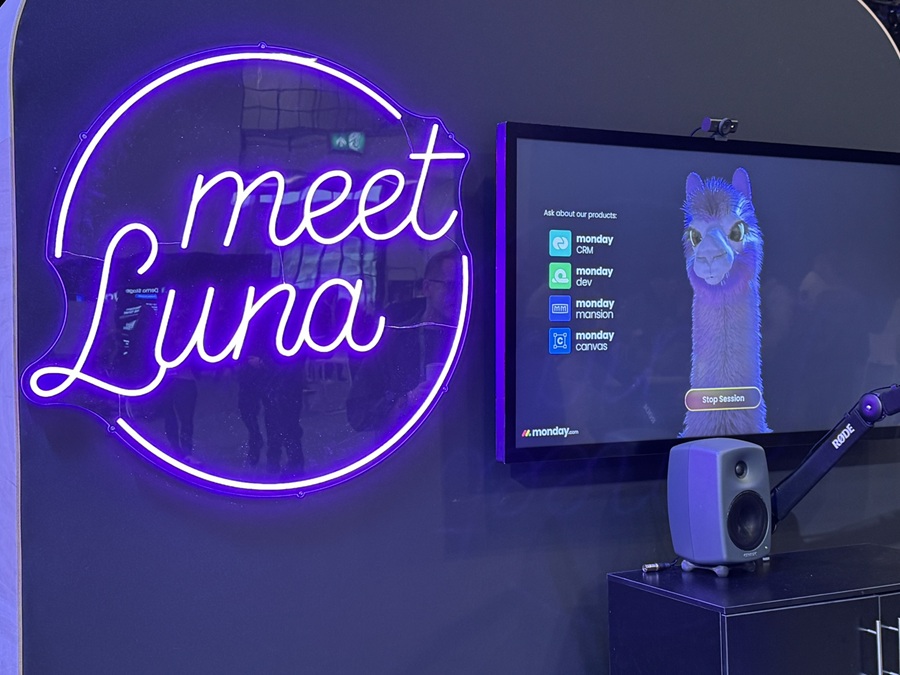October 24, 2025
Monday.com’s London Elevate 2025: Campaigns, Llamas and Talking to CMO Harris Beber

For a $15 billion company, monday.com’s Elevate at Excel London was a surprisingly homely affair. (Aside from the missed opportunity to change an arena named after a spreadsheet. Surely a guerrilla marketing rebrand was in order?)
Beyond the big stage, there was plenty of space for small huddles, intimate demos and tech talks. As partners and customers gathered to hear the latest in CRM, workflow and management features. On the stage, top of the bill was Steve Wozniak. He gave the keynote and joined in for a fireside chat with CMO Harris Beber on AI and all things tech.
They discussed the key trends shaping the future of work and what leaders must prioritise over the next 12 months to inspire ingenuity, foster entrepreneurship and build stronger teams in a tech-driven world.
On the show floor, Quack AI’s report on the future of CX also got people talking. While the hunt was on for missing Luna Llama’s monday.com’s avatar/mascot. Chatting to attendees, there was applause and much focus on relationships and collaboration (even in the AI age), work management and the new Campaigns feature.
Harris Beber Talks (and Talks) Campaigns
Harris Beber is monday.com’s new CMO and was a busy bunny (llama?) with his own post-lunch presentation on the company’s AI–powered Campaigns that drew plenty of positive responses from the audience. Currently in alpha and tagged with a Q1 2026 release date, it promises heavily automated end-to-end marketing campaigns that improve based on returns and feedback through:
- AI-powered creation – Generates copy, suggests audience segments from CRM data, and ensures on-brand messaging.
- Intelligent automation – Triggers personalized campaigns from CRM updates and customer actions.
- Optimal timing – AI recommends the best send times for maximum impact.
After he escaped the stage, CXM sat down to talk with Harris about his first months at monday.com, and what he has in the pipeline.
During your presentation you mentioned “They go big here!” can you explain what it has been like in your time at monday.com?
“Yeah, I’ve worked at some of the largest tech companies in the world, and I’ve always been in a position where marketing is pushing product to deliver on time, because we do all these plans as a marketer, and then like, oh, the launch is delayed.
Monday.com, not only delivers innovation and ships product, but, like, it’s available faster than marketing can keep up. which is a very unique position for me to be in as a CMO, and so we’re adapting our ways of working, how we do marketing, so we can make sure that everything that’s being released, all that value, our users are aware of it.
Not even acquiring new customers or existing users, right? You could build the best things in the world, but if you don’t get people using them or make them aware, it doesn’t offer them any value. So it’s really changed how we think about our go to market, the types of marketing we do.”
Okay, and customer data flowing into marketing throughout everything within monday.com. How does that influences how change marketing, given that everything’s happening so quickly?
“Not so much with customer data, but I believe the best marketing keeps the user at its core. So who’s the audience that we’re targeting? And one are the benefits of being a platform is we serve so many. We have 200 different industries across hundreds of different customers.
One of the challenges as a marketer is, you can’t say we do everything, right? So being very specific for the audience we’re targeting, with their unique needs and understanding them.
I think what’s changed dramatically is as a platform, all the other platforms like Google, Facebook etc have become more algorithmic, and you have less control, so it’s more in the black box.
The thing that makes a difference is how well can you articulate the value and how fast you’re able to iterate and test to make sure that the message is resonating. We’ve had a change dramatically, our approach to marketing, of, like, testing, iterating, because there’s what people say they want, and then there’s the behaviours that they actually take, and those don’t always align. “
Luna llama looks like a useful avatar to sell monday.com to non-tech, non AI-natives, how is that working?
“Luna was an idea the CEO had, and they built it in under two months. So Luna is more of an informative ideas, a representation to make it human. I think the people struggle with is that right now, across industry, AI capabilities and innovations are happening faster than anyone could adopt.
And the biggest restriction that I’m seeing, both in my past companies and here, is that, like, is human nature, right? So the capabilities are there, they’re not even aware of thinking to ask about it.
But that said, monday.com vibe is great, right? You could build any application. People know the problems they have, but then you give them a blank text box and say, build your software. They’re not always able to articulate what they want. So Luna is a great way of bringing that information out. So, Luna is a great voice that solves the question, how do you make AI accessible?”
If there is still truth in that 90% of users only use 10% of features? How are you getting customers to explore the new stuff that adds value?
“Take the most advanced software, even the best experts, like an amazing finance professional that uses Excel, they’re still using a small fraction of the features. Same with Photoshop, right? It could be an advanced artistic designer, and you’re still using a small fraction.
The way we’re doing it is finding two things. One is surfacing it in an appropriate situation. So how do you do it in product? I think user experience is really important. A web page telling you about features isn’t all that helpful, but when you’re in that moment and you can surface contextual value, that’s the best way to drive adoption, and we’re really focussing on that.
That’s one of the reasons why I came to monday.com, quite frankly. It’s very rare that you have a B2B software that people say they love. And the essence of our campaigns came from customer insights. Them saying they love using the product and that comes from the user and customer experience.
How do you make things really useful? We talked about it earlier, like, AI is happening so fast, you said, it’s hard to understand what’s coming through. It hard to absorb it all. The best AI is going to be the one that people actually use. Models will keep evolving but it means nothing if people don’t use it, and I think that’s where making it accessible and fun is a differentiator.”
All in all, a great day to look under the hood of some very focused and powerful AI tools. And now my social feeds are full of llamas (monday.com’s ad team play a great game), so I guess its time to leave Excel!





